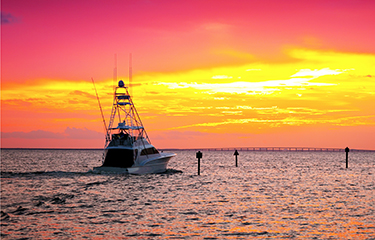An appeals court ruling in favor of Gulf of Mexico charter boats earlier this year could play a big role as the U.S. Supreme Court determines the limits of NOAA Fisheries’ rulemaking authority.
Earlier this month, the U.S. Supreme Court announced that it will take up a challenge to federal regulations brought by New Jersey fishermen, who sued the government to stop a 2020 New England Fishery Management Council (NEFMC) rule that would force them to pay for at-sea monitors out of pocket. Fishermen argued that the financial burden of paying for monitors was crippling for their business
At the center of that challenge is a legal precedent known as the Chevron deference, which allows regulatory agencies to take on lawmaking authority on Congress’ behalf. While regulatory agencies have frequently cited Chevron in making rules without direct congressional input, several groups are pushing back, arguing that Chevron-based rulemaking has gone too far.
While the fishermen did not have success at either the Washington D.C. Federal District Court or the Washington D.C. Federal Circuit Court, the Chevron challenge at the heart of their lawsuit has given them an opportunity to plead their case before the Supreme Court. In taking up Loper Bright Enterprises v. Raimondo, the Supreme Court noted that it is only considering the Chevron claims in the lawsuit.
“The Supreme Court has an opportunity to correct one of the most-consequential judicial errors in a generation. Chevron deference has proven corrosive to the American system of checks and balances and directly contributed to an unaccountable executive branch, overbearing bureaucracy, and runaway regulation,” said Cause of Action Institute Counsel Ryan Mulvey, who represents the New Jersey fishermen.
But a ruling by the U.S. Court of Appeals for the Fifth Circuit in February 2023 could play a role in limiting regulatory overreach, according to lawyers involved in the case.
Mexican Gulf Fishing Company v. U.S. Department of Commerce was a class-action lawsuit filed by the New Civil Liberties Alliance (NCLA) on behalf of more than 1,300 charter boat owners looking to overturn NOAA Fisheries regulations requiring 24/7 GPS-monitoring of vessels and electronic reporting of every trip.
“They were going to be tracked whether they were fishing or not fishing, whether they’re going to get gas, whether they were going to take someone to dinner, whether they were sightseeing,” NCLA Senior Litigation Counsel John Vecchione said in a press conference.
Like in the Loper Bright case, the regulatory agency required boat owners to pay for the monitoring out of pocket.
“What made it so egregious for me is the fact that NOAA mandated that I purchase – that all charter boat captains have to purchase these vessel-monitoring systems at a cost of anywhere from USD 500 to USD 3,000 [EUR 460 to EUR 2,760] apiece and pay a vessel-monitoring system that was going to be around USD 75 [EUR 69] a month in perpetuity as long as we maintained our fishing licenses,” Allen Walburn of A&B Charters, one of the fishermen in the lawsuit, said.
That’s a lot of money to pay for an electronic system that simply duplicated the paper logbook fishermen were already required to keep, Walburn added.
“This issue would have been a death knell for a lot of fishermen, because you have to have this device on your boat, and you have to pay the cost of the device, and you have to pay the tracking fees every month,” Walburn said. “A lot of the charter fishermen in this country, especially in the southeast, are what we call part-time fishermen. They'll have a full-time job Monday through Friday, and then they'll use their boats to take people out for hire on the weekends. And having to buy these expensive devices and pay the USD 75 [EUR 69] a month or more for the service charges and stuff would have just caused them to say it's not worth the effort.”
In the Gulf of Mexico case, the Fifth Circuit ruled that NOAA Fisheries could not use ambiguous language in the Magnuson-Stevens Act to authorize the monitoring and tracking regulations. The court also found that 24/7 GPS monitoring likely violates the 4th Amendment.
“The Loper Bright case is similar to this in that there is silence in the statute, and when there’s silence, does the agency get to do what it wants?” Vecchione said. “I think it will be cited to Supreme Court in this upcoming Loper Bright decision.”
Photo courtesy of Ruth Peterkin/Shutterstock







